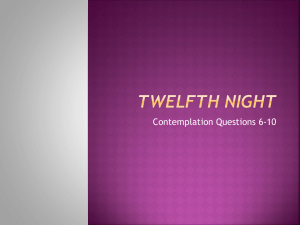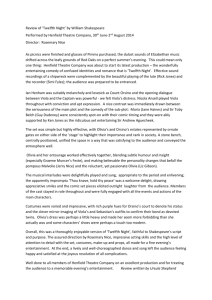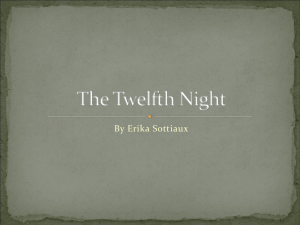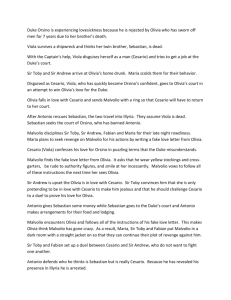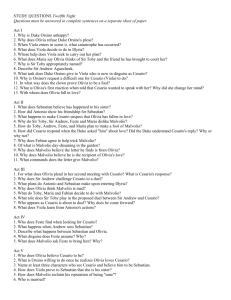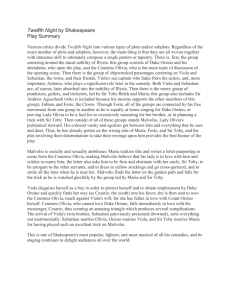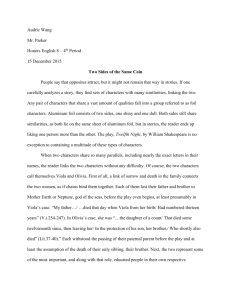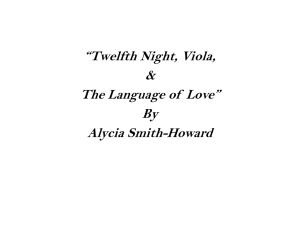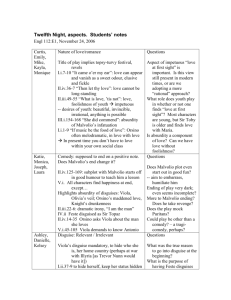Analyzing the Theme of Deception in
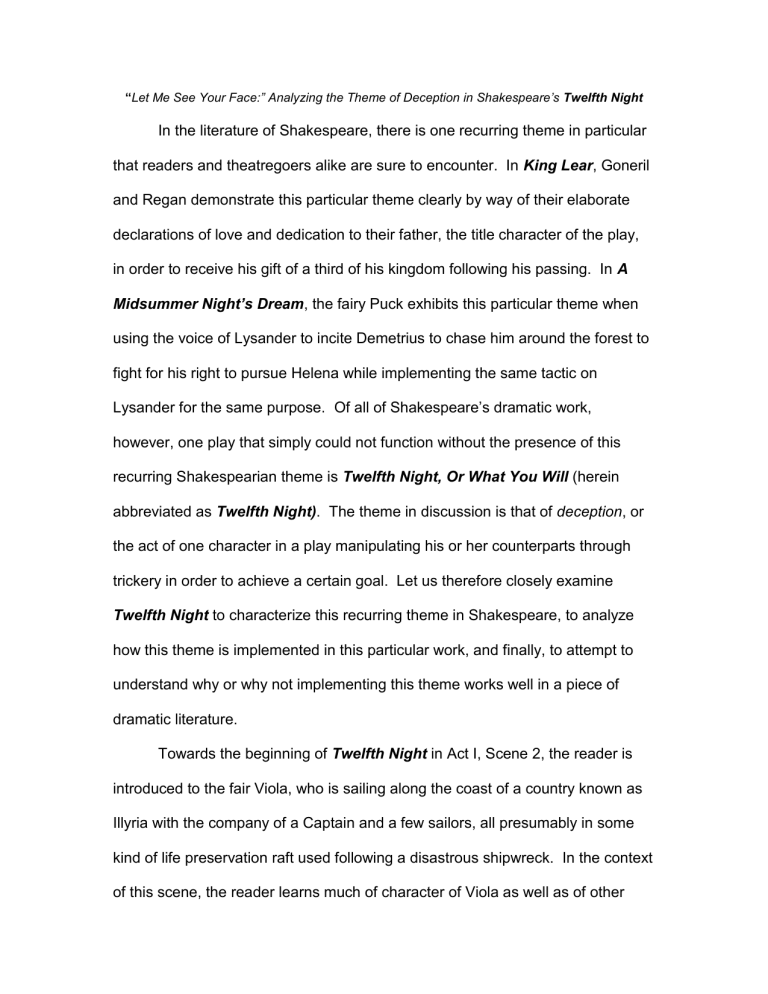
“Let Me See Your Face:” Analyzing the Theme of Deception in Shakespeare’s Twelfth Night
In the literature of Shakespeare, there is one recurring theme in particular that readers and theatregoers alike are sure to encounter. In King Lear , Goneril and Regan demonstrate this particular theme clearly by way of their elaborate declarations of love and dedication to their father, the title character of the play, in order to receive his gift of a third of his kingdom following his passing. In A
Midsummer Night
’s Dream
, the fairy Puck exhibits this particular theme when using the voice of Lysander to incite Demetrius to chase him around the forest to fight for his right to pursue Helena while implementing the same tactic on
Lysander for the same purpose. Of all of Shakespeare’s dramatic work, however, one play that simply could not function without the presence of this recurring Shakespearian theme is Twelfth Night, Or What You Will (herein abbreviated as Twelfth Night) . The theme in discussion is that of deception , or the act of one character in a play manipulating his or her counterparts through trickery in order to achieve a certain goal. Let us therefore closely examine
Twelfth Night to characterize this recurring theme in Shakespeare, to analyze how this theme is implemented in this particular work, and finally, to attempt to understand why or why not implementing this theme works well in a piece of dramatic literature.
Towards the beginning of Twelfth Night in Act I, Scene 2, the reader is introduced to the fair Viola, who is sailing along the coast of a country known as
Illyria with the company of a Captain and a few sailors, all presumably in some kind of life preservation raft used following a disastrous shipwreck. In the context of this scene, the reader learns much of character of Viola as well as of other
characters that have been and have yet to be introduced themselves, principally those of Orsino, Duke of Illyria, and Olivia, a countess of the same country.
When Viola inquires the Captain as to their whereabouts, he responds that their troubled ship is heading fast towards the land of Illyria, and he tells Viola of
Orsino: “A noble duke, in nature as in name” (1.2.22). In response, Viola indicates having a certain feeling of affection of the Duke in pointing out that, when she last heard about him from her father, “He was a bachelor then”
(1.2.25). The Captain verifies Viola’s assertion about Orsino’s marital status, but he cautions her that the Duke has his eye on the countess Olivia, who has thus far refused any petition of love from the Duke following the deaths of her father and brother. Viola then hatches a plan:
I pray thee – and I’ll pay thee bounteously –
Conceal me what I am, and be my aid
For such disguise as haply shall become
The form of my intent. I’ll serve this duke.
Thou shalt present me as an eunuch to him.
It may be worth thy pains, for I can sing.
And speak to him in many sorts of music
That will allow me very worth his service. (1.2.49-55)
Here we see the most evident example of deception in Twelfth Night: the act of disguising one’s outward, physical appearance. By posing as a eunuch, or a male individual who has been castrated to preserve a soprano singing voice,
Viola will be able to disguise herself in the garments that a man would wear at the time while accounting for what may be perceived to be an unusually high voice for a man.
Through this act of deception in which she assumes the identity of a man named Cesario, Viola eventually earns the right to serve Orsino in his court.
Through this service, she earns the office of confidence of her object of affection, who is consequently moved to share his deepest inner thoughts and emotions.
Convinced that she is a fellow man worthy of his trust, Orsino reveals his true perceptions of women and love to Viola without reservation. When Viola improvises a story of falling in love with a maiden of Orsino’s age in order to support further her disguise as Cesario, Orsino offers the following retort on how such a relationship should be:
Let still the woman take
An elder than herself. So wears she to him;
So sways she level in her husband’s heart.
For, boy, however do we praise ourselves,
Our fancies are more giddy and unfirm
More longing, unwavering, sooner lost and worn,
Than women’s are.
[...]
[Then] let thy love be younger than thyself,
Or thy affection cannot hold the bent.
For women are as roses, whose fair flower
Being once displayed, doth fall that every hour. (2.4.28-33, 35-38)
Later on in the same scene, however, the lovesick Orsino contradicts his own perceptions of women and love when discussing his adoration for Olivia. After elevating a woman’s capacity to love to such an awesome pedestal were she may “sway the level in her husband’s heart” (2.4.30) and she may maintain an
affection for a man while that man “cannot hold the bent” (2.4.36), Orsino goes on to contend the following with respect to Olivia:
There is no woman’s sides [that]
Can bide the beating of so strong a passion
As love doth give my heart; no woman’s heart
So big, to hold so much. They lack retention. (2.4.92-95)
As a consequence of this contradiction, one could argue that Orsino has in fact become the victim of another deception perpetuated by his skewed perceptions of women and love. For a man who believes himself to be in love with a certain woman, Orsino appears to be misguided in terms of establishing what the quality of being in love truly is when exercising these judgments on measuring the capacities for how man and woman can love one another. If Orsino cannot determine accurately for himself what the quality of being in love is, he therefore logically cannot determine accurately for himself whether or not he truly is in love.
Hence, through Orsino’s act of self-deception, the reader may be able to infer that Olivia may not be the woman for him after all.
Just as Orsino is deceived by Viola’s disguise as the gentleman Cesario, the countess Olivia is equally deceived when Viola ventures to her house on
Orsino’s behalf. Despite the fact that Olivia has been said to “abjure the sight a nd company of men” (1.2.36), she admits Viola disguised as Cesario into her home to hear what Orsino’s subject has to say. Viola soon earns her trust through lavish poetical gestures articulating Olivia’s beauty. Olivia signals the onset of this trust by relinquishing her own disguise of sorts through the act of tossing aside her veil when Viola bids her, “Good madam, let me see your face”
(1.5.218). From that moment on, Olivia openly entertains the poetic praises that
Viola as Cesario is bestowing upon her on behalf of the Duke, yet she sees through these praises and chooses not to be led astray by hearsay heralding the
Duke’s reputation:
Olivia: How does he love me?
Viola [as Cesario]: With adorations, fertile tears,
With groans that thunder love, with sighs of fire.
Olivia: Your lord does know my mind, I cannot love him.
Yet I suppose him virtuous, know him noble,
Of great estate, of fresh and stainless youth,
In voices well divulged, free, learned, and valiant
And in dimension and shape of nature,
A gracious person; but yet I cannot love him. (1.5.242-249)
Prior to this exchange in dialogue, however, Viola detects Olivia’s own flawed perception of beauty. When criticizing Olivia for being “the cruell’st she alive / If you will lead these graces to the grave / And leave the world no copy” (1.5.228-
230), suggesting that Olivia should not deprive the world of descendants that would carry her beauty through heredity, Olivia interprets the remark as a suggestion to leave an itinerary detailing what one would require to be as beautiful as she. In characterizing her perception of beauty in this manner, she reveals implicitly that her own standards for finding love in a man are dependent upon that man’s credentials, be they by physical or social reputation. After Viola departs, however, Olivia contradicts her own standards when expressing her sudden love for the gentleman Cesario in a brief soliloquy that closes this scene:
I do I know not what, and fear to find
Mine eye too great a flatterer for my mind
Fate, show thy force. Ourselves we do not own.
What is decreed must be; and be this so. (1.5.296-299)
By falling in love with a man she just met, Olivia thus demonstrates that she had been deceiving herself when assessing potential suitors by their credentials as would an employer scan one’s résumé. She later will continue to resign herself to fate rather than careful assessment even after she eventually realizes that she has exchanged vows with Viola’s brother Sebastian rather than the contrived character of Cesario, but she chooses not to withdraw from Sebastian’s side, in spite of the fact that she barely knows him.
Yet another act of deception in Twelfth Night occurs in the context of the sub-plot involving the company of Sir Toby, Sir Andrew, Maria, and Feste the fool. As Sir Toby is a close relative to Olivia, she permits him to stay in her house. On an evening in Olivia’s house filled with drunken cheer and song,
Malvolio, a close friend of Olivia’s and a third resident of the house, angrily storms into the commotion to tell Sir Toby and the others to quiet down and cease their racket. Sir Toby, appalled by Malvolio’s bitter reaction to a harmless celebration, scoffs at Malvolio: “Art any / more than a steward? Dost thou think because thou art / virtuous there shall be no more cakes and ale?” (2.3.106-108)
Infuriated by remarks such as that of Sir Toby’s, Malvolio vows retaliation, growling, “She [Olivia] shall know of it [this uncivil rule] by this / hand” (2.3.116-
117). Malvolio thus deceives himself by believing that he truly has the capacity to terminate what he perceives to be unruly behavior. When he realizes that he
cannot stop the commotion Sir Toby and his camaraderie are causing on his own, he retreats to the support of the local authority represented in this case by
Olivia, convinced that he will get what he wants eventually. Unfortunately, for
Malvolio, Sir Toby and his cohorts choose not to relent with their festivities.
Following his intrusion, Maria then spearheads a prank designed to recompense
Malvolio for interrupting their fun by making love letters to Malvolio to convince him that Olivia has fallen in love with him. Malvolio is easily deceived by these letters, for they are tailored to match his convictions for being the saintly civilized steward he aspires to be.
Let thy tongue tang arguments of state; put thyself into the trick of singularity. She thus advises thee that sights for thee.
[...]
I say remember, go to, thou art made if thou desirest to be so; if not, let me see thee a steward still, the fellow of servants, and not worthy to touch For- tune’s fingers. (2.5.141-143, 145-148)
Near the play’s completion, Malvolio discovers that the letter and all the events that came to be assoc iated with it (namely Feste’s portrayal of one Sir Topas the curate, who convinces Malvolio that he has gone mad) was all a practical joke, to which he vows in response: “I’ll be revenged on the whole pack of you” (5.1.373).
Yet Malvolio is never given the chance for such retribution in the context of
Twelfth Night , thus reaffirming once again that Malvolio cannot always get what he wants, contrary to his own personal belief.
Through this careful analysis of the recurring theme of deception in
Shakespeare ’s Twelfth Night , one can perceive accurately the reasons why using this theme is so effective in a piece of dramatic literature. The theme of deception can be implemented as a useful plot device, as evidenced when Viola disguises herself as the gentlemen Cesario and moves back and forth between
Orsino and Olivia to deliver various messages, as well as when Maria aids Sir
Toby and his camaraderie in their retaliation against Malvolio’s bothersome intrusions. Additionally, the theme of deception functions adeptly to provide the reader with a deeper insight into a certain character’s feelings and philosophy, as shown in the examples detailing the true and false convictions of Orsino, Olivia, and Malvolio. From these observations that mark its versatility, its archetypal nature, and its significance within the context of a story, the theme of deception is therefore indispensable to dramatic literature.
